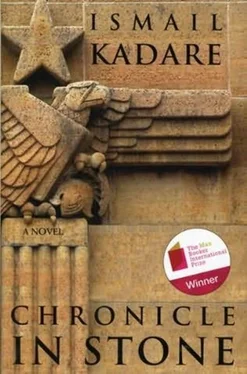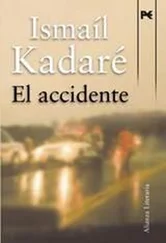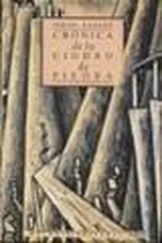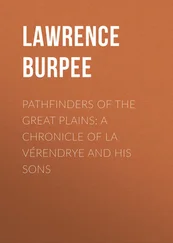Ismaíl Kadaré - Chronicle in Stone
Здесь есть возможность читать онлайн «Ismaíl Kadaré - Chronicle in Stone» весь текст электронной книги совершенно бесплатно (целиком полную версию без сокращений). В некоторых случаях можно слушать аудио, скачать через торрент в формате fb2 и присутствует краткое содержание. Жанр: Современная проза, на английском языке. Описание произведения, (предисловие) а так же отзывы посетителей доступны на портале библиотеки ЛибКат.
- Название:Chronicle in Stone
- Автор:
- Жанр:
- Год:неизвестен
- ISBN:нет данных
- Рейтинг книги:4 / 5. Голосов: 1
-
Избранное:Добавить в избранное
- Отзывы:
-
Ваша оценка:
- 80
- 1
- 2
- 3
- 4
- 5
Chronicle in Stone: краткое содержание, описание и аннотация
Предлагаем к чтению аннотацию, описание, краткое содержание или предисловие (зависит от того, что написал сам автор книги «Chronicle in Stone»). Если вы не нашли необходимую информацию о книге — напишите в комментариях, мы постараемся отыскать её.
Chronicle in Stone — читать онлайн бесплатно полную книгу (весь текст) целиком
Ниже представлен текст книги, разбитый по страницам. Система сохранения места последней прочитанной страницы, позволяет с удобством читать онлайн бесплатно книгу «Chronicle in Stone», без необходимости каждый раз заново искать на чём Вы остановились. Поставьте закладку, и сможете в любой момент перейти на страницу, на которой закончили чтение.
Интервал:
Закладка:
He left. Gradually we recovered from the shock. The sights of the market comforted us as we walked through it. On counters, in baskets, sacks and unfolded kerchiefs lay a world of green that couldn’t be found in our part of the city: cabbage, onions, lettuce, milk, fresh eggs, cheese, parsley. And in the midst of it all, the clinking of coins. Questions and answers. “How much?” “How much!” Murmurings. Curses. “May you drop dead before you eat them!” “This’ll pay for your doctor.” So much poison flowed over the lettuces and cabbages! Where worms crawled, there crept death… “And how much is that?”
We walked on. At the far end of the market an Italian soldier sat playing a harmonica and making eyes at the girls. We were back at the cinema. There was no film that day.
We went home. On my way upstairs, I heard my youngest aunt laughing. She was sitting on a chair, jiggling one leg and laughing loudly. Xhexho looked over to Grandmother two or three times, but she only pursed her lips as if to say, “What can you do, Xhexho? That’s how girls act these days.”
My father came in. “Did you hear?” my aunt said to him at once. “They took a shot at the King of Italy in Tirana.”
“I heard at the coffee house,” my father said. “The assassin had hidden his pistol in a bouquet of roses.”
“Really?”
“They’re going to hang him tomorrow. He’s only seventeen.”
“Oh, the poor boy,” Grandmother sighed.
“The end of the world.”
“Too bad he didn’t get him,” my aunt shouted out. “The roses got in his way.”
“Where do you hear such things?” my mother asked in a tone of reproach.
“Here and there,” was all my aunt would say.
Xhexho adjusted the kerchief on her head, said goodbye to Grandmother and Kako Pino, and left. Kako Pino left soon after. My aunt stayed on for a while.
I went up the two flights. There was still some activity in the streets. The last people were going home from the market. Maksut, Nazo’s boy, was carrying a cabbage that looked like a severed head. He seemed to be smiling broadly.
The peasants had started packing up. Soon their black cloaks would darken the streets – Varosh, Palorto, Hazmurat, Çetemel, Zall – and the highway and bridge too, as they made their way back to the villages that we never saw. The city, like a tethered horse, would swallow up the greenery they had brought. But all that soft green, that meadow dew and tinkle of cowbells, was not enough to soften the city’s harshness. They were leaving now, their black cloaks dancing in the twilight. The cobblestones flashed their last sparks of anger under the iron horseshoes. It was getting late. The peasants had to hurry home to their villages. They never even turned to look back at the city, alone now with its stones. A muffled ringing rolled down the hill from the citadel. Every evening the guards checked the window bars, striking them rhythmically with iron rods.
I saw the last of the peasants crossing the bridge over the river and I thought about the strange division of people into peasants and city-dwellers. What were the villages like? Where were they and why didn’t we ever see them? To tell the truth I didn’t really believe the villages existed. It seemed to me that the peasants were only pretending to go to their villages, while actually they weren’t going anywhere, just crouching behind the scattered bush-covered hillocks around the city, waiting out the long week for another market day, when once again they would fill the streets with greens, eggs and the tinkling of bells.
I wondered how it was that it had occurred to people to pile up so many stones and so much wood to make all those walls and roofs and then call that great heap of streets, roofs, chimneys and yards a city. But even less comprehensible were the words “occupied city”, which came up more and more in the grown-ups’ conversations. Our city was occupied. Which meant that there were foreign soldiers in it. That much I knew, but there was something else that bothered me. I couldn’t see how a city could be unoccupied. And anyway, even if our city wasn’t occupied, wouldn’t there be these same streets, the same fountains, roofs and people? Wouldn’t I still have the same mother and father and wouldn’t Xhexho, Kako Pino, Aunt Xhemo and all the same people still come to visit?
“You can’t understand what a free city means, because you’re growing up in slavery,” Javer told me one day when I asked him about it. “It’s hard to explain it to you, believe me, but in a free city, everything will be so different, so beautiful, that at first we’ll all be dazzled.”
“Will we get a lot to eat?”
“Of course we’ll eat. But there’ll be lots of other things besides eating. So many things that I don’t even know them all myself.”
From time to time the sun shone through the clouds. The rain fell in sparse drops that seemed to smile secretly. The wooden door opened and Kako Pino went out into the street. Skinny, dressed all in black, holding the red bag with her instruments under her arm, she set out nimbly down the street. The rain fell lightly, joyfully. There was a wedding somewhere, and Kako Pino was going. Her wizened hands, drawing various objects out of her bag – tweezers, hairpins, thread, boxes – decorated the brides’ faces with star-like dots, cypress branches and signs of the zodiac, all floating in the white mystery of powder.
I exhaled lightly on the windowpane, fogging up the image of Kako Pino. All I could see was a black shape waddling at the far end of the street. Some day she would go out like that to make up my bride. Could you paint a rainbow on her face, Kako Pino? I had been wondering about that for a long time.
But now she had turned into another street, where she looked even smaller among the intolerably tall houses. Behind the heavy doors, with their solid iron fittings, were the beautiful young brides.
FRAGMENT OF A CHRONICLE
we met again, this time in Nuremberg. The happy news had just been announced. Ettore Muti, secretary of the Fascist Party and a great friend of Albania, would soon be visiting our region. Our city is preparing a fitting reception. Trial. Executive orders. Property. The body of our fellow citizen L. Xuano was fished out of the river. Killed when he was supposed to appear as a witness in the Angonis’ suit against the Karllashi family. The case, which has been going on for sixty years now, has done great harm to our city. It has been discovered that Ahmet Zogu, the sultan of Albania, the Ogre, bought a palace in Vienna for two million leks as a gift for his mistress, Mizzi. The heaviest person in the city right now is Aqif Kashahu, who weighs 159 kilos. The troublesome elements have been expelled from the secondary school. All citizens possessing arms without permits are to report to the command post. The seventeenth of this month is the deadline. Bruno Arcivocale commanding. Our fellow citizen Bido Sherifi returned yesterday from Tirana, where he spent ten days. Births. Marriages. Deaths. To A. Dhrami and to Z. Bashari was born a boy, to M. Xhiku a girl. N. Fico married E. Karafili,
THREE
A number of things happened in the city that seemed unrelated at first. A veiled woman was seen fiddling with something on the ground at the last crossroads on the street leading to the citadel. Then she sprinkled the place with water and left quickly, getting away from the people who tried to follow her. An unknown old woman was seen under a window of Nazo’s house, where her young daughter-in-law was cutting her nails. The old woman gathered up the nail clippings in the street and went off cackling to herself. Bido Sherifi woke up suddenly in the middle of the night, crowed two or three times like a rooster, and went back to sleep. The next morning he claimed he remembered nothing. Two days later Kako Pino found a pile of damp ashes in her yard. But everything became clear after what happened to Mane Voco’s wife. Then no one could say that these events were unrelated, as had been thought at first. One day, towards noon, a dark-skinned woman knocked at Mane Voco’s door and asked for a glass of water. The lady of the house brought it for her, but the stranger drank only half of it. As Mane Voco’s wife held out her hand to take back the glass, the unknown woman suddenly said, “Why do you give me water in a dirty glass?”, and threw what was left of it in her face. Mane Voco’s poor wife turned pale with fear. Then the visitor vanished in the twinkling of an eye. Mane Voco’s wife quickly put a cauldron on the fire, bathed from head to foot, and burned the clothes she had been wearing.
Читать дальшеИнтервал:
Закладка:
Похожие книги на «Chronicle in Stone»
Представляем Вашему вниманию похожие книги на «Chronicle in Stone» списком для выбора. Мы отобрали схожую по названию и смыслу литературу в надежде предоставить читателям больше вариантов отыскать новые, интересные, ещё непрочитанные произведения.
Обсуждение, отзывы о книге «Chronicle in Stone» и просто собственные мнения читателей. Оставьте ваши комментарии, напишите, что Вы думаете о произведении, его смысле или главных героях. Укажите что конкретно понравилось, а что нет, и почему Вы так считаете.












